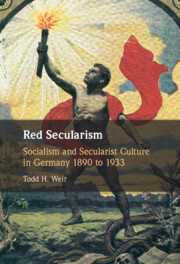Book contents
- Red Secularism
- Red Secularism
- Copyright page
- Contents
- Figures
- Tables
- Preface
- Abbreviations
- 1 Introducing Socialism and Secularism as Two Cultures
- 2 Secularist Culture in an Industrializing City
- 3 Prometheans
- 4 The Sociology and Psychology of Secularist Intellectuals
- 5 Workers and Worldview
- 6 The Politics of Secularism 1905–1914
- 7 Secularists in War and Revolution 1914–1922
- 8 Monism in the Weimar Workers’ Culture Movement
- 9 Culture War at the End of the Weimar Republic
- Epilogue
- Appendixes
- Archives Used
- Index
7 - Secularists in War and Revolution 1914–1922
Published online by Cambridge University Press: 30 November 2023
- Red Secularism
- Red Secularism
- Copyright page
- Contents
- Figures
- Tables
- Preface
- Abbreviations
- 1 Introducing Socialism and Secularism as Two Cultures
- 2 Secularist Culture in an Industrializing City
- 3 Prometheans
- 4 The Sociology and Psychology of Secularist Intellectuals
- 5 Workers and Worldview
- 6 The Politics of Secularism 1905–1914
- 7 Secularists in War and Revolution 1914–1922
- 8 Monism in the Weimar Workers’ Culture Movement
- 9 Culture War at the End of the Weimar Republic
- Epilogue
- Appendixes
- Archives Used
- Index
Summary
This chapter shows the significant role played by religious politics in the German Revolution of 1918. It examines first how the secularist subculture within German socialism contributed to the formation of wartime opposition that led to the 1917 split of the Social Democratic Party (SPD). It then follows the actions of secularists during the revolution itself, beginning with the attempts of one of Germany’s most prominent secularists, Adolph Hoffmann, to force through a radical program of secularization upon assuming a key position in the revolutionary government of 1918. It traces the politics of secularism in the writing of the Weimar Constitution before taking up the relationship of secularism to the “pure” council movement, which emerged in the years from 1919 to 1922 as an alternative both to parliamentary democracy and to Bolshevik party rule.
Keywords
- Type
- Chapter
- Information
- Red SecularismSocialism and Secularist Culture in Germany 1890 to 1933, pp. 196 - 238Publisher: Cambridge University PressPrint publication year: 2023

